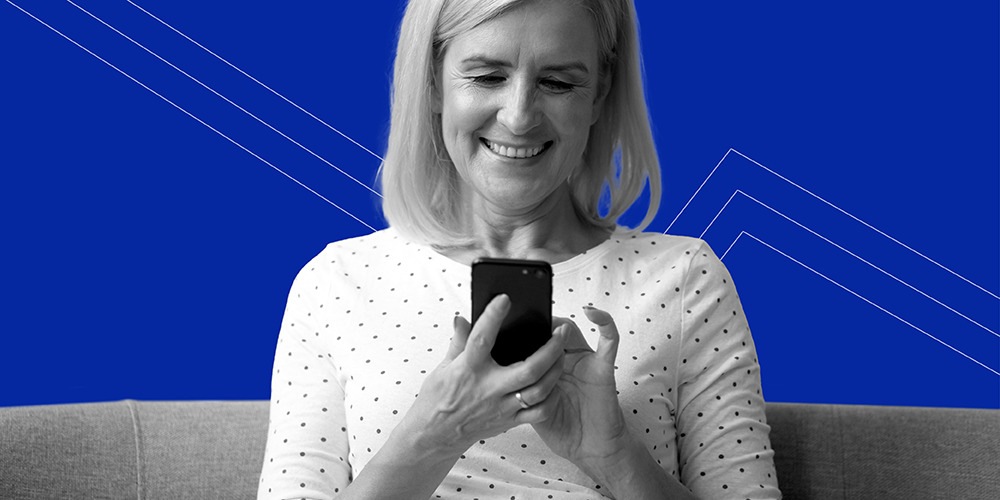Affordable Phone Plans to Avoid Bad Credit

Smartphones are more essential than ever these days. You might even be reading this article on one right now! Unfortunately, they can also get pretty expensive.
And if you don’t pay your phone bill on time, it can actually end up making your credit score worse. So how can you get the vital phone services you need without risking bad credit?
Thankfully, there are likely affordable phone plans within your budget, but you have to be careful! Some potential providers may attempt to take advantage of your situation. That’s why we spoke to the experts to make sure that your phone plan isn’t a PHONY plan (sorry) (just kidding, we’re not sorry).
Consider lesser known carriers.
You probably see a lot of ads from the major cell phone carriers. Your Verizons and Sprints and AT&Ts, if you will. But what about the carriers that might not be able to afford massive advertising budgets? The ones who never had the chance to ask if you could hear them now. When comparing pricing possibilities, it can be worth looking at the carriers less often considered. That’s what Gabe Lumby of Cash Cow Couple did.
“We really like Republic Wireless as a cheap phone plan option and have written a detailed review on our site about the service,” Lumby told us. “I've personally used the service for over 3 years and outside of some occasionally spotty coverage, I have no complaints. We only pay $31 and change for both my wife and I's cell phone plans. Here is a link to their pricing page.
“Regardless of which carrier is chosen, it is smart to look at some of the new players in the space when looking to save money. Some other options include Straight Talk and Virgin Mobile.
“There are other competitors as well, but my advice would be to look at some of these lesser known options instead of your large carriers.”
Cut down on data usage.
This is a pretty obvious tip, but it’s still important. Unless you have an unlimited data plan, which can be a huge expense in and of itself, you have to be very careful about not going over your data or you’ll face grim punishment (in the form of higher fees). But you don’t need to take our word for it. Here’s what Lumby said: “Also, try hard to curb your data usage. Many people have large data plans when they could be using free wifi at their work, restaurants, etc. Data is the huge money drain.”
Beware the “free phone”.
There’s no price better than free, which is why you should be immediately suspicious of anyone offering you a free phone. We aren’t experts, but we’re pretty sure there are all sorts of expensive electronics and tiny computers that go into the creation of a phone, so no one is going to be giving you one unless they’re expecting to get something out of it.
Brett Graff, The Home Economist and author of “Not Buying It,” offered this warning: “If the phone is for an elderly person, you can apply to the FCC for a credit towards a landline or a cell phone. Otherwise, don't fall for the free phone. God it's tempting, I know. But prices for cell phone and wireless services are dropping constantly and you're in a better position to negotiate without a contract.
“Many times, that ‘free’ phone isn't free at all, it's divided into monthly payments tacked on to your bill. What's more, if you want to really save, you can buy an inexpensive phone that matches your plan almost anywhere. Then you must shop around to find the lowest prices but remember what those prices include and always—always—check your bill. Third party providers are excellent at slipping fees on, so look for anything unusual such as ringtones or horoscopes that you didn't order. The most common cramming fee is for $10.99, so if you're charged that amount for a service you don't want, call and complain because you've likely been scammed.”
Curtis McCoy, CEO of BestCellular.com, had his own list of hidden dangers “free phone” providers can try and trick you into:
“In the United States, smartphone plans can range upwards of $100/mo. Many companies advertise a great price or ‘free phones’ but it has become almost an industry standard to charge hidden fees (on top of what the customer knowingly agreed to when signing the contract).
“Some of the common hidden fees can include:
- Finance charges on ‘free’ devices.
- ‘No contract’ cell phone plans that lock the customer into an ‘agreement’ when financing the new phone.
- Many larger carriers charge up to $40/mo. in what they call a ‘line access fee.’ This is literally an additional fee to have a phone number (above and beyond the advertised price).
- Many prepaid wireless stores are now charging a ‘Service Convenience Fee’ to pay your bill in-store with a live agent.
- Other carriers and Mobile Virtual Network Operators offer, ‘Unlimited Data’ that is capped or throttled when you hit the LIMIT a.k.a. ‘Reasonable Usage Policy CAP.’”
McCoy also offered some additional tips for saving on your cell situation:
“Tips that can save you a LOT of money on your phone bill:
- If at all possible, save up and pay cash for your phone instead of making payments. If you're convinced that you must have a new phone but can't afford it, even a high-interest credit card is cheaper than financing through a cellular retailer.
- If you can make due with a used/refurbished phone, you can save a lot of money as well.
- If you have a working phone from another carrier, some companies let you bring your own phone or activate online: https://BestCellular.com/Activate
- Just connecting to WiFi when you're at home, work, school or the local coffee shop can save you money!
- Mobile Data is the most expensive part of your phone bill. Use these tips to Save Mobile Data and you can also save a lot of money: https://BestCellular.com/SaveData/”
You should also read about and see if you might qualify for the Lifeline Program, which offers subsidized phones based on need.
Take all of this advice together, and you’ll be talking on the phone, without losing your home!

Brett Graff (@BrettGraff), has been seen writing and reporting on money and personal finance in The LA Times, Yahoo! Finance, Cosmopolitan, The New York Times and the Fiscal Policy Institute, to name a few. Brett also provides her insight in the column, The Home Economist, which is nationally syndicated and published in newspapers all over the country. Her book “NOT BUYING IT: Raising Happier, Healthier & More Successful Kids” is now available!

Gabe Lumby is the CMO at Cash Cow Couple (@CashCowCouple) where he helps get the word out on how readers can build their best financial life. In his free time, he enjoys spending time with his family and crappie fishing the local waterways of Southwest Missouri.



